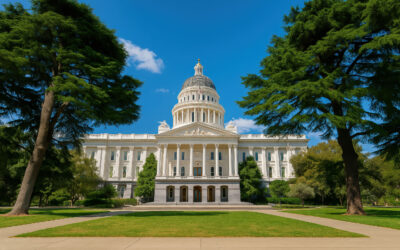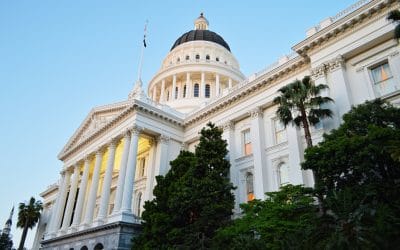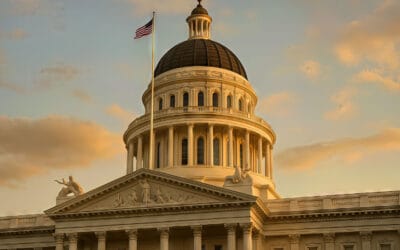Sunday at midnight was the deadline for the Governor to act on the hundreds of bills on his desk. As a follow up to bills we highlighted at the end of the legislative session, here’s a quick look at what the Governor signed and what he vetoed.
- AB 5 (Gonzalez) – Worker Status: Employees and Independent Contractors
This bill codifies, the California Supreme Court’s decision in Dynamex Operations West, Inc. v. Superior Court of Los Angeles, which held that a worker is presumed to be an employee unless the employer satisfies a three-factor test. AB 5 also provides exemptions for specified occupations and business relationships, which are instead governed by the multifactor test established in the California Supreme Court’s previous decision, S.G. Borello & Sons, Inc. v. Department of Industrial Relations. - AB 48 (O’Donnell) – Public Preschool, K-12, and College Health and Safety Bond Act of 2020
This bill places a $15 billion “Public Preschool, K-12, and College Health and Safety Bond Act of 2020” on the March 3, 2020 ballot. If passed, the new measure would overhaul major portions of the state’s School Facilities Program. More details are available in our recent update. - AB 170 (Gonzalez) – Worker Status: Employees and Independent Contractors
A companion bill to AB 5, AB 170 further expands the exemptions to the Dynamex ABC test to include, until January 1, 2021, newspaper carriers and newspaper distributors. - AB 218 (Gonzalez) – Damages: Childhood Sexual Assault: Statute of Limitations
This bill extends the time for commencement of actions for childhood sexual assault to 40 years of age or five years from discovery of the issue, allows a victim to recover up to triple damages when there has been a concerted effort to hide evidence related to the assault, and creates a three-year window where claims that would otherwise have been barred as of January 1, 2020 may be revived. The bill also changes the standard for claims against employers of an accused employee from requiring the employer knew of the unlawful conduct and failed to implement reasonable safeguards to prevent the abuse, to instead only require the employer meet one of those two criteria in order for an action to be commenced. - AB 1219 (Jones-Sawyer) – Teacher credentialing: certificated employee assignment monitoring
This bill repeals the provisions related to the current practice of teacher assignment monitoring, and adds new language that will allow all assignments to be monitored every year through a new electronic database. Charter school teachers and authorizers will also be included in the new system, though authorizers will not need to correct misassignments of charter school teachers employed in the 2019-20 school year until July 1, 2025. - AB 1505 (O’Donnell) – Charter Schools: petition and renewal
The bill reforms the authorization, renewal, and appeal provisions of the Charter Schools Act. More details are available in our recent update. - AB 1507 (Smith) – Charter Schools: Location: Resource Center
This measure eliminates the ability to authorize a charter school located outside the boundaries of the authorizing school district or county. - SB 223 (Hill) – Pupil health: administration of medicinal cannabis: schoolsites
SB 223 allows school boards, county boards, and charter school governing bodies to adopt a policy that allows parents or guardians to possess and administer medicinal marijuana to their children at the schoolsite, provided the child is a qualified patient under existing law. SB 223 was revived by Senator Hill this year after Governor Brown vetoed a similar proposal in 2018. - SB 276 (Pan) – Immunizations: Medical Exemptions
This bill increases state oversight of medical exemptions for mandatory vaccinations required for school attendance, including requiring the California Department of Public Health to develop a standardized electronic medical exemption certification form and to review medical exemptions from schools or physicians that meet specified criteria. - SB 328 (Portantino) – Pupil Attendance: School Start Time
This bill prohibits middle schools and high schools, including those operated as charter schools, from starting school earlier than 8:00 a.m. and 8:30 a.m. respectively. The bill exempts rural school districts, a term that is undefined in the bill, and allows for schools to offer earlier classes to a limited number of students but prohibits those classes from counting towards a school’s average-daily-attendance (ADA) for purposes of apportioning state funding. - SB 419 (Skinner) – Pupil discipline: suspensions: willful defiance
This bill, as of July 1, 2020, extends the existing prohibition on suspending a pupil enrolled in K-3 for disrupting school activities or otherwise willfully defying school authorities, to pupils enrolled in grades 4 and 5. The bill also extends this prohibition to pupils in grades 6-8 until July 1, 2025, and applies the prohibition to charter schools. - SB 714 (Pan) – Immunizations
A companion bill to SB 276, this bill allows a student that has a current medical exemption to continue to attend school under that exemption until the student enrolls in the next grade span and removes the requirement under SB 276 that the standardized form created under the bill be signed under penalty of perjury.
Vetoed Legislation
- AB 197 (Weber) – Full-day kindergarten
This bill would have required every school within a school district, and every charter school serving pupils in the early primary grades, to implement at least one full-day kindergarten program. - AB 500 (Gonzalez) – School and Community College Employees: Paid Maternity Leave
This bill would have required school districts, charter schools, and community colleges to provide at least six weeks of full pay for pregnancy-related leave of absence taken by certificated, academic, and classified staff. - AB 967 (Smith) – Charter Schools: LCAPs
This bill would have required a charter school to submit its Local Control and Accountability Plan (LCAP) to their charter authorizer for review and approval. It also have required charter schools to comply with various other LCAP requirements that currently apply to school districts and county offices of education. - AB 1085 (McCarty) – After school programs: substance use prevention: funding: cannabis revenue
This bill would have encouraged ASES and 21st Century Programs to develop programs that educate youth about substance use and abuse, to be administered through an inter-agency agreement between Department of Health Care Services and CDE, and would have specifically allowed those programs to receive Proposition 64 (2016) revenue.




0 Comments